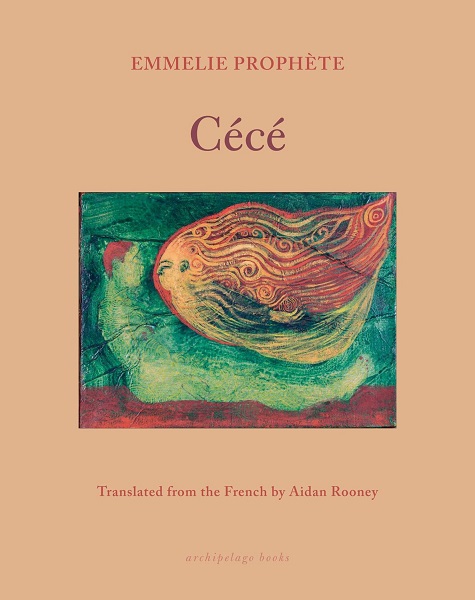

Whole-hearted kudos to Aidan Rooney for Cécé (Archipelago Books, September 2025), his English translation of Emmelie Prophète’s novel Les Villages de Dieu (Mémoires d’Encrier, 2020). It has been described as “an astonishing novel of raw beauty about gang life, sex work, and social media in Haiti.” Dany Laferrière called the book “The best book on Haiti in a very long time . . . powerful, spot on, likely the best written.”
Description: Cécé La Flamme, as she’s known by her loyal Facebook friends, captures photographs of still bodies. Figures scorched and bruised, left to the rubble of the Cité of Divine Power. When she posts an image of a corpse, Cécé’s followers skyrocket. “Nothing got more attention than a good corpse that was nice and warm or already rotting.” Just beside visions of rot and neglect, she posts pictures of her toes, gullies crisscrossing the cité, and her own lips painted blue. With every image, Cécé seeks control and wants to create a frank, intimate record of the terror in her cité.
Cécé’s world begins and ends with the cité – a slum peopled by gangs, yelping kids, grandmothers, junkies, and preachers. The very gate that encloses the cité was constructed by militant gang members. First boss Freddy, then Joël, then Jules César rule the gang that holds the cité in a chokehold. Sharp, sincere, and desperate, Cécé cleaves life for herself out of social media, sex work, and attempts at friendship with other women. When an American journalist offers to buy the rights to Cécé’s photographs, she demands double the cash. When an abusive former client dies, she wears hot pink to his funeral. Emmelie Prophète’s novel is fierce, devastating, and suggestive – a record of a woman clawing back control.

Emmelie Prophète (born in Port-au-Prince, Haiti) is a novelist, poet, and journalist. Her work has been published by Mémoire d’encrier: Le testament des solitudes (2009), winner of the 2009 Grand Prix littéraire of the Association of French-Language Writers (ADELF); Le reste du temps (2010), which recounts her special relationship with journalist Jean Dominique, assassinated in 2000; Impasse Dignité (2012); Le bout du monde est une fenêtre (2015); and Un ailleurs à soi (2018). Les Villages de Dieu, her most recent novel (2020), has received immense public and critical acclaim. In 2021, Emmelie Prophète received the Prix du rayonnement de la langue et de la littérature française, awarded by the French Academy [L’Académie française].
Aidan Rooney (b. 1965, Monaghan, Ireland) is a teacher at Thayer Academy in Massachusetts, USA. Rooney’s poetry collections include Go There, Tightrope, and Day Release. His translations from Haitian Kreyòl and French can be read elsewhere at AGNI, Asymptote, Carte Blanche, Tanbou, as well as in print in New American Writing #39. Rooney’s most recent poetry collection is Go There (Madhat Press, 2020). His honors include the Sunday Tribune / Hennessy Cognac Award for New Irish Poetry and the Daniel Varoujan Award from the New England Poetry Club. Born in Monaghan, Ireland, he lives in Massachusetts.
For more information, see https://www.penguinrandomhouse.com/books/797464/cece-by-emmelie-prophete-translated-from-the-french-by-aidan-rooney/ and https://archipelagobooks.org/book/cece/
For more on Les Villages de Dieu, see https://memoiredencrier.com/catalogue/les-villages-de-dieu/
Whole-hearted kudos to Aidan Rooney for Cécé (Archipelago Books, September 2025), his English translation of Emmelie Prophète’s novel Les Villages de Dieu (Mémoires d’Encrier, 2020). It has been described as “an astonishing novel of raw beauty about gang life, sex work, and social media in Haiti.” Dany Laferrière called the book “The best book on Haiti in





